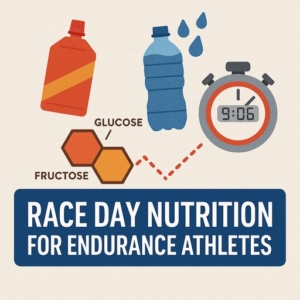Race Day Nutrition for Endurance Athletes
Race Day Nutrition for Endurance Athletes
Coach Chris explains that when it comes to endurance events that last longer than two or three hours—like marathons, half Ironmans, and full Ironmans—your race day nutrition can make or break your performance.
Bonking, cramping, GI distress, and dehydration aren’t just random mistakes—they’re usually the result of an untested or poorly designed fueling plan. As we roll into race season, now’s the time to dial in your strategy with science-backed guidance that actually works in real life.

Why “Lab Perfect” Isn’t “Race Ready”
Let’s be real—you’re not racing in a lab. You’ve got race-day adrenaline, variable course conditions, and real-world products—not controlled environments and perfectly timed feeds. That’s why your fueling plan needs to be tested in training and personalized to your physiology.
Carbs: The Cornerstone of Endurance Nutrition
Here’s what you need to know:
- Your body maxes out at absorbing ~60g/hr from a single carb source like glucose.
- Adding a second source, like fructose, boosts absorption to ~90g/hr or more by tapping into a different transport system in the gut.
That’s why you’ll see newer endurance fuels using carb blends. They help improve performance and reduce GI distress, especially in longer events where glycogen depletion (aka bonking) is a real risk.
Train Your Gut Like You Train Your Legs
One of the biggest mistakes I see? Athletes who practice fueling once or twice before a big event—and then wonder why their stomach rebels on race day.
Your gut is adaptable, but only if you give it the chance.
- Start practicing your full race-day fueling plan during long workouts, ideally at least 4–6 weeks out.
- Focus on timing, volume, and types of fuel so your GI system knows what to expect.
The more you practice, the more efficient your body becomes at absorbing carbs and fluids during exercise.
Hydration: Why a One-Size-Fits-All Approach Falls Flat
Hydration isn’t just about drinking water. It’s influenced by:
- Weather (heat, humidity)
- Sweat rate and sodium loss (yep, that varies person to person)
- Clothing and intensity
- Your genetic makeup (you’re special–yay!)
“Drink to thirst” might sound simple, but for long races, it’s not enough and may cause you to fall behind on hydration, and your fueling goes with it—not to mention performance and recovery.
Sweat testing and hydration planning give you the edge by helping you avoid both under- and over-hydrating (hint: this is EXACTLY what we do in our Fueling & Hydration Bootcamp)
Don’t Forget the Pre-Race Plan
Forget the pasta party the night before (or don’t, if it’s fun and feels good to you!).
- Focus on consistent carb intake in the 2–3 days leading up to your race.
- Aim for a light, carb-rich meal 3–4 hours before race start (or a snack 1–2 hours prior if that suits you better), but don’t sacrifice sleep to get it.
The goal is to top off your glycogen stores without upsetting your stomach—and again, practice this routine in training to avoid surprises.
Your Mind Affects Your Gut
Here’s something most people overlook: Stress impacts digestion.
- Race-day nerves can speed things up (cue: bathroom sprints) or slow things down (cue: bloating and nausea).
- Incorporate mental training with sports psychology—like breathwork or visualization—to help your gut stay steady under pressure.
Want Help Putting It All Together?
If you’re ready to stop guessing and start feeling confident in your fueling, join our Fueling & Hydration Bootcamp starting this May. We’ll help you build a personalized, tested plan based on your goals, event, and physiology.
🎯 Get on the priority list now at theenduranceedge.com/fuelingbootcamp
Don’t Miss Out! Get on the Fueling & Hydration Bootcamp waitlist
Join here so you’re the first to know when it opens!
Disclaimer: The information shared in this podcast is for educational and informational purposes only and is not a substitute for professional medical advice, diagnosis, or treatment. Always seek the advice of your qualified healthcare provider with any questions you may have regarding a medical condition or health goals. Never disregard professional medical advice or delay in seeking it because of something you heard on this podcast. Reliance on any information provided is solely at your own risk.


